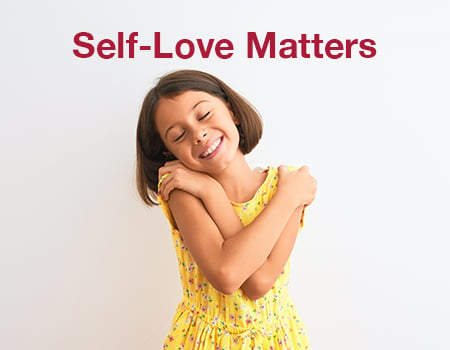An old adage says that you cannot love others if you do not love yourself. At the same time, you are bombarded with messages that measure everyone against some ideal whether it is weight loss, a new car, or the elusive perfect…whatever. The underlying message is that you are not enough the way you are and with what you have. The ads are not about true self-improvement, but the way you can fix your problem of inadequacy by buying their product or service. So, you look around at the world and beat yourself up because you cannot attain the ideal, no matter how much you try. Well, there is a way to evolve into the person you want to be--$0.00; convenient; tailored to you; you control the outcome. What could do such a thing? Other than journaling, that is. The transforming power of self-love. Underneath the umbrella of self-love are the elements of self-compassion, self-acceptance, and self-care.
Working Definition of Self-love
Self-love is the recognition, acknowledgement, acceptance, and appreciation for who you are—all parts of you. The lifestyle of self-love is an expansive process over time as you grow and change. You acknowledge you are imperfect, and so is everyone else. Many people struggle for years trying to become…something different from who, what, where they are. Others make whatever the accomplishment was look so easy, or so lucky. You are sucked into a downward spiral of self-rejection. But you can learn to love who you are, what you look like, your capabilities. What seems easy for you is astounding to others. You can learn how to protect yourself from loving, well-meaning people that say you just are not enough. Here is a partial list of a life of self-love:
- healthy boundaries
- self-advocacy
- knowing your abilities and using them with satisfaction
- smiling at yourself in the mirror
- working to change behaviors that no longer serve you
- engaging in activities that nurture you and bring you joy.
You compare yourself to others many thousands of times a day. Think about the number of people you see and hear as you go about your daily routine and how you engage in judgment and comparison. Every time you see other people and hear about the success of others, you deem yourself superior or inferior in countless areas—appearance, education, occupation, possessions, popularity, etc., etc., etc. When you make unhealthy comparisons of yourself to others, you discount everyone. You send the message to yourself that you are not okay as you are. You see yourself and others as objects that either do or do not meet the ideal residing in your mind. This is not to say that healthy comparison has no place. You may see where in your life change would benefit you. The distinction between a desire to improve your life and an obsession with the perpetual chasing of a dream based on someone else’s free-floating opinions and rules makes all the difference.
What does self-love look like?
Self-love is a whole-life approach to everything you do with self-compassion and self-acceptance which leading to self-care. You treat yourself with kindness. You claim your worth as a precious human being. You take care of your whole being—physical, mental, emotional, and spiritual. You believe in your ability to contribute to the life you want and the community in which you live. You spend time with people and activities that bring you meaning, joy, and peace.
Self-love does not equal narcissism which commands you to see yourself above others. Instead, you view yourself with honesty and offer yourself validation for using your skills, whether innate or learned. You also see where in your life you want to create a new reality, a new perspective of yourself.
The elements of self-love are distinct yet interrelated, active, fluid ways of being. You may be in different states at times, or you may inhabit several states at once in several areas of your life or in the same one. Here is a closer look at them.
Self-compassion
How you treat yourself with kindness, gentleness, softness, and tenderness, especially when difficulty enters your life. You comfort and forgive yourself in the moment as much as possible. You acknowledge that you may need to apologize, make an amend, or pay restitution. You see yourself as a human being who makes mistakes, just as every human being does.
Self-compassion Journaling Exercise
- Open your journal and have a pen handy.
- Think of an experience in which you said or did something you later regretted or a negative message you tell yourself. Relax and allow your emotions to surface.
- Now, see yourself as a friend observing you. What kind words and gestures would your friend offer you? “I know you are sorry for what you did. But this is not who you are. You made a mistake as we all do.” “Your experiences have left you with a distorted view of yourself. I see a delightful, smart, creative person who cares a lot about others.”
- Place your hand over your heart, close your eyes, take three deep breaths. When you are ready, open your eyes.
- Now, write about the experience with eyes of sensitivity and empathy for yourself. Write soothing, comforting words to yourself.
- Then write about your new perspective and include your feelings toward yourself.
Self-acceptance
This element is the ongoing process of acknowledging you are neither good nor bad, but are instead a mix of thoughts, beliefs, traits, and behaviors, some of which you like and others you do not. Together, they make up the whole of who you are as an individual unlike any other individual. Because everyone is universally unique, there can be no comparisons. Again: Because everyone is universally unique, there can be no comparisons. One more time: Because everyone is universally unique, there can be no comparisons. You step back and look at the whole of your life and see how each experience contributed to your evolution and wisdom. So, you decide which beliefs and behaviors you can change, should you so choose, and which ones you can accept in peace.
Self-Acceptance Journaling Exercise
- With the expansion from self-compassion, you can look closer at your humanity, your vulnerability as a human being. Try to view your mistake or message as a lesson to address. How did thenerror, or the pattern it is part of, serve a need that damaged(s) your relationships with yourself and with other people?
- Write about the experience with a desire to see the situation differently. You did what you knew in the moment and the moment is now gone. What have you learned? What new information did you find out? What can you do now? What do you need or want? Who can help you?
- Write the prompt: I am at peace knowing I did my best at the time. I can practice a new approach to help me prepare for next time. Close your eyes and take three deep breaths and, when you are ready, open your eyes. Open your heart and your mind to peace.
- Journal about the prompt as you allow this new understanding to seep into your being.
Self-care
When you love someone or something, you nurture it whether with your family and friends or the houseplant someone threw out that you refuse to let die. You extend that care to yourself. You take steps to make your environment—whether your home or office, or the oceans and forests—an inviting and comfortable space. You learn what feels good and nourishes you and what brings you emotional pain. You seek out ways to enrich your life by opening your mind to learning and to facing challenges with
strength and conviction. You discern the difference between acting courageously and taking unnecessary risks. Your presence commands respect from yourself and others.
Self-care journaling exercise:
- Close your eyes and take three deep breaths.
- Make lists of what makes you feel good, makes you happy, brings you peace, gives you senses of purpose and meaning, energizes you. Go wild. Use different colors of ink if you have colored pens. Draw. Write upside down, sideways, in the margins.
- Write about each one, expanding on how they contribute to your well-being.
Self-love
As discussed above, self-love is comprised of all the ways you treat yourself with kindness. All the ways you find joy in yourself. All the ways you feel and express gratitude for your being. All the ways you honor the gifts of your abilities. You pamper your body, your mind, your spirit. You integrate new activities and people into your life who encourage and support you. The vagaries that make life a challenge and an adventure take on new meanings. You turn to your inner resources for guidance and enlist the support of others when needed.
Self-love Journaling Exercise:
- Look for ways to integrate self-compassion and self-acceptance into your daily life.
- When facing difficult situations, remember to celebrate all that you are. Embrace the quirks that make you unique. Remember, all humans are alike, and every human is different.
- Write fully about your joys, your triumphs, your achievements, you innate gifts, your goals, your ideas. Smile. Giggle. Laugh so hard you make no sound.
Self-love is a life-long, ever-evolving process of experience and evaluation. Perfect does not exist here. We continue to learn. Although self-care is the last point on the trajectory, it is supported and propelled by self-compassion and self-acceptance and the cycle begins anew.
Breathe deeply. Be generous to yourself. Be kind to yourself. Keep writing.

Author bio: Billie Wade is a writer living in central Iowa. She is the creator and founder of Journaling to Heal, a program she designed to help people as they travel their journey of healing from emotional stress and trauma. Her background, education, and experience enhance her innate compassion and reverence for other human beings.
Billie Wade is a writer living in central Iowa. She is the creator and founder of Journaling to Heal, a program she designed to help people as they travel their journey of healing from emotional stress and trauma. Her background, education, and experience enhance her innate compassion and reverence for other human beings.
She shares her strength and hope on www.journalingtoheal.com.



Leave Comment